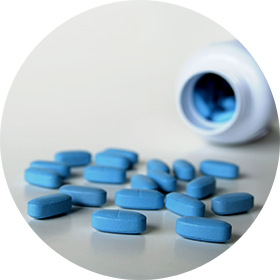News Briefs – DECEMBER 2021
TRANSGENDER CANCER SCREENINGS | CALIFORNIA MAID ACCESS | VIAGRA AND ALZHEIMER’S | PSILOCYBIN AND FRONTLINE COVID WORKERS

Krakenimages.com/Adobe Stock
Transgender People Face Barriers to Cancer Screenings
Cancer screenings allow for early detection and can make a significant difference in treatment success. According to an online article in Health Essentials from the Cleveland Clinic, numerous barriers exist for transgender people that prevent them from receiving some cancer screenings, which can lead to diagnosis at later stages. These barriers result from economic disparities, discrimination by health care providers, and screening protocols that don’t acknowledge the difference between anatomy and gender identity.
One in five transgender adults is uninsured, making it harder to afford some screenings. This is particularly true for people who identify as nonbinary, according to the United States Transgender Survey (USTS), which surveyed 27,000 respondents, making it the largest survey of transgender-identifying individuals in the United States. Results showed that nonbinary individuals were 17% to 18% less likely to have health insurance compared with other survey respondents, who were also underinsured when compared with heterosexual, cisgender populations.
Discrimination is another important barrier: 30% of respondents in the USTS had experienced health care discrimination. As a result, many transgender people postpone care due to fear of discrimination or not having a health care provider. “If a person has had a negative health experience, they’re less likely to engage and stay engaged in their own health promotion,” said Henry Ng, MD, a transgender health specialist, in the Health Essentials article.
Some specific cancer screening protocols also serve as a barrier to early detection. For example, the American Cancer Society recommends that people assigned the gender of female at birth (AFAB) get a mammogram each year between ages 45 to 54. But some transgender people are uncomfortable with this test. The same kind of discomfort affects AFAB people who should be screened for cervical cancer with a Pap smear every three to five years starting at the age of 21. For trans people assigned the gender of male at birth (AMAB), the recommendation to start getting prostate screening around the age of 55 can also be uncomfortable.
Overcoming these barriers will require changes to health care programs and further education for providers. However, the Health Essentials article suggested there are steps the transgender population can take now, such as researching a provider’s level of experience with transgender people, asking their community for recommendations, paying attention to a provider’s language to make sure it’s inclusive, and filing complaints if they experience discrimination.
California Eases Access to Medical Aid in Dying
As of January 1, 2022, the California End of Life Option Act, which permits terminally ill adult patients to pursue medical aid in dying, will undergo significant changes. Primary among them is a dramatic reduction from 15 days to 48 hours in the waiting time between the two required oral requests by a patient to their attending physician.
The new bill, which was signed into law by Governor Gavin Newsom in October of this year, also eliminates the requirement that an individual who is prescribed the medication make a final attestation. It extends the Option Act from its expiration in 2026 to January 2031. The new law requires any health care provider who is unable or unwilling to participate under the act to inform a person seeking aid in dying medication that they do not participate, document the date of the request, and transfer the relevant medical record upon request. The bill would also require a health care entity to post its current policy on medical aid in dying on its website.
Viagra May Combat Alzheimer’s Disease
Ana de Sousa/Adobe Stock
After screening a database of seven million male patients followed over a six-year period, researchers at the Cleveland Clinic found that Viagra appears to reduce the risk of developing Alzheimer’s disease by 69%. To further explore the drug’s potential effect on Alzheimer’s, the researchers developed a lab model that showed Viagra (a brand name for sildenafil) increased brain cell growth and reduced the accumulation of tau and amyloid proteins that present in Alzheimer’s diagnoses.
The lead researcher for the study, Feixiong Cheng, warned that the results do not prove a causal relationship between sildenafil and Alzheimer’s. The next step, according to Cheng, would be a Phase II randomized clinical trial among men and women. This would test the causal relationship and sildenafil’s ability to prevent the disease. Naturally, repurposing an existing drug is cheaper and is less time-consuming than developing an entirely new medication.
While the data is scientifically interesting, researchers caution people not to rush out and start taking Viagra to deter Alzheimer’s. Future clinical trials are necessary before sildenafil might become an approved prevention or treatment option.
Psilocybin Study on Depression in Frontline Pandemic Workers
The Food and Drug Administration has given the green light to what is considered the first trial in the United States to examine the benefits of psilocybin for depression, anxiety, and burnout in frontline workers fighting the COVID-19 pandemic. The synthesized psilocybin will be combined with a therapeutic program used by a diverse population of clinicians. Results from the study are expected to be available in a year.
The lead researcher, Anthony Back, MD, of the University of Washington in Seattle, pointed out that the current mental health situation for frontline workers is serious and that there is no documented therapy that has been proven to work. Psilocybin has been studied in other trials and found effective in treating depression, PTSD, and death anxiety among the terminally ill.
The 30 participants will be split into psilocybin and placebo groups. The psilocybin group will receive a 25 mg dose of the medication following the initial therapy session. After the medication session, the participants will have three follow-up therapy sessions. The placebo group participants will also receive counseling. Dr. Back’s team will work with the Canadian biopharmaceutical company Cybin using an adapted version of its EMBARK psychedelic-assisted therapy program to train and guide the therapists. Six to eight licensed clinicians across disciplines at the University of Washington and elsewhere are being trained to conduct the sessions. Cybin is cofunding the study.

